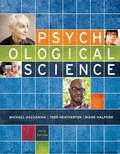
a
To identify:
The given statement “remembering that a poodle is a type of dog”belongs to either a retrieval cue, a schema, or the effect of activating a node.
Introduction:
The schema is the mental representation of the information. It helps to understand how something happens and works. The schema theory gives, if the new information is taken by the memory, then that is compared to the pre-existing schema present in the memory.
b
To identify:
The given statement, “scoring higher on atest when you sit at the same desk where you sat during the lecture” belongs to either a retrieval cue, a schema, or the effect of activating a node.
Introduction:
Memory is the capacity of the nervous system to hold and ability to recover knowledge and skills. The memory and learning occur in three necessary stages include encoding, storage, and retrieval. The initial learning of information is called an encoding. Storage is storage of information for a long period of time and retrieval is recalling the information from the past.
c
To identify:
The given statement, “hearing a bark and thinking of a furry, four-legged animal who likes to wag its tail and lick your face” belongs to either a retrieval cue, a schema, or the effect of activating a node.
Introduction:
The spreading of the activation model is explained by Collins and Loftus. These spreading activation is used in the cognitive psychology and applied in the retrieval of the information.
d
To identify:
The given statement, “feeling very anxious about your chemistry exam and scoring poorly even though you studied and knew the material well when you were calm” belongs to either a retrieval cue, a schema, or the effect of activating a node.
Introduction:
Memory is the capacity of the nervous system to hold and ability to recover knowledge and skills. The memory and learning occur in three necessary stages include encoding, storage, and retrieval. The initial learning of information is called an encoding. Storage is storage of information for a long period of time and retrieval is recalling the information from the past.
Want to see the full answer?
Check out a sample textbook solution
Chapter 7 Solutions
EBK PSYCHOLOGICAL SCIENCE (FIFTH EDITIO
- How can social workers contribute to prison or criminal justice reform efforts and initiatives? Please cite in text source and list references.arrow_forwardCriminological theory support drunk driving appropriatenessarrow_forwardthe capacity to still feel wonder in essential for the creative processarrow_forward
- How does music influence your emotions? Can you recall a specific song or piece of music that has evoked strong emotions in you? What was it about that music that elicited such a response? Instructions: Recall a song that evoked strong emotions What emotions did the song help you feel? and why? Are there specific musical elements (e.g., melody, rhythm, harmony, lyrics) that you find particularly powerful in shaping emotional experiences? How do these elements contribute to the overall emotional impact of a piece of music?arrow_forwardAnalyzed the relevant state or federal policies and drunk driving related to criminological theory, focus on specific needs of the public and the relevant branch of the criminal justice system in the center of the departmental policy justifying your identicationsarrow_forwardn which sentence is the comma optional? Zach, no doubt, has a reasonable explanation for not setting the table for dinner. Since I grew up in a nearby community, I would prefer to live near Topeka, Kansas. Let’s get an opinion from Emily Bassett, who has experience in training others. Before reading the sign, I didn’t guess that the gadget on the counter was a toaster.arrow_forward
- How does poverty affect people? How does poverty affect our society? Do you think anti-poverty strategies are an important part of a social welfare system? Why? Please cite in text source and list referencesarrow_forwardGiven the following request to an AI chatbot, which response is better? (You can use Google to check the accuracy of each response.) Prompt Write a love poem about someone longing for a sandwich. Make it a sonnet, and give it a tone that straddles a serious love poem and whimsy appropriate for a poem about a sandwich. Response Response A Response B Oh, sandwich, where art thou, my bread?I love you, your ham, your cheese.My stomach rumbles and my tummy grumbles.I can’t wait for you to fill my belly!The lettuce is crisp and crunchy.The tomatoes are red and sweet.The mustard is spicy!The bread is soft and yummy.Between two slices, I found paradise.It’s like an orgasm for my soul, and I cry at the sweetness.It’s a simple and deeply profound pleasure.It abates my hunger and gives my muscles fuel.Thank you for nourishing me.With every bite, joy does resound. In famished depths, I pine upon my bed,Sweet thoughts of thy most holy meat and breadDrift through my mind like a…arrow_forwardI need help with this assignment I need help finding articles for this research question Evolutionary psychology & Body Modifications (piercings, tattoos, bodybuilding, cosmetic surgery)arrow_forward
 Ciccarelli: Psychology_5 (5th Edition)PsychologyISBN:9780134477961Author:Saundra K. Ciccarelli, J. Noland WhitePublisher:PEARSON
Ciccarelli: Psychology_5 (5th Edition)PsychologyISBN:9780134477961Author:Saundra K. Ciccarelli, J. Noland WhitePublisher:PEARSON Cognitive PsychologyPsychologyISBN:9781337408271Author:Goldstein, E. Bruce.Publisher:Cengage Learning,
Cognitive PsychologyPsychologyISBN:9781337408271Author:Goldstein, E. Bruce.Publisher:Cengage Learning, Introduction to Psychology: Gateways to Mind and ...PsychologyISBN:9781337565691Author:Dennis Coon, John O. Mitterer, Tanya S. MartiniPublisher:Cengage Learning
Introduction to Psychology: Gateways to Mind and ...PsychologyISBN:9781337565691Author:Dennis Coon, John O. Mitterer, Tanya S. MartiniPublisher:Cengage Learning Psychology in Your Life (Second Edition)PsychologyISBN:9780393265156Author:Sarah Grison, Michael GazzanigaPublisher:W. W. Norton & Company
Psychology in Your Life (Second Edition)PsychologyISBN:9780393265156Author:Sarah Grison, Michael GazzanigaPublisher:W. W. Norton & Company Cognitive Psychology: Connecting Mind, Research a...PsychologyISBN:9781285763880Author:E. Bruce GoldsteinPublisher:Cengage Learning
Cognitive Psychology: Connecting Mind, Research a...PsychologyISBN:9781285763880Author:E. Bruce GoldsteinPublisher:Cengage Learning Theories of Personality (MindTap Course List)PsychologyISBN:9781305652958Author:Duane P. Schultz, Sydney Ellen SchultzPublisher:Cengage Learning
Theories of Personality (MindTap Course List)PsychologyISBN:9781305652958Author:Duane P. Schultz, Sydney Ellen SchultzPublisher:Cengage Learning





